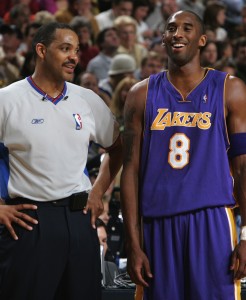Kobe Bryant’s slur: What the #%$& do we do with profanity?
Update: Bleacher Report’s policy on profanity has changed since this post was published. Please see the post Important changes to Content Standards on profanity, gambling, attribution for the current policy.
Last week Kobe Bryant got in trouble for uttering an alliterative, homophobic slur that TV cameras caught. And while it was easy to read his lips and see that he’d called referee Bennie Adams a “fucking faggot,” it wasn’t so easy to find out what he’d said by reading about it.
Many newspapers and websites went no further than I did in the first sentence of this post, not wanting to offend readers.
It can be a tough call, a difficult balancing act, trying to figure out whether to use profanity or hurtful speech in a story. You don’t want to offend readers, but then again, if those words are part of the story, you’re short-changing readers by leaving them out and making readers guess what they were.
It becomes a silly word game, doesn’t it? An alliterative, homophobic slur. Come on.
Roy Peter Clark of the Poynter Institute, the journalism school in St. Petersburg, Fla., offers a strong suggestion in a column that wrestles with various issues brought up by Bryant’s outburst:
News organizations should print or broadcast the offensive expression so that audiences can know what was actually said. Paraphrases, euphemisms, verbal veils do not work …
Such candor was nowhere in sight on a number of news and sports gab fests. I listened to one such show and waited for more than 15 minutes for someone to use the word in question. All I got were euphemisms, bowdlerizations, adjectives, passive constructions, and uncountable uses of the pronoun “it,” as in “it should not have been said …”
Publishing taboo words that arise in the news does not require red headlines, bold face or 30-point type. A word can be revealed in the body of the text, or inside the paper, or via a link on the website. Any further inhibitions smack of a misguided political correctness, however well intended.
Clark conducted a live chat about the issue of how to handle slurs like the one Bryant used on Thursday afternoon.
At Bleacher Report, we frown on our writers using profanity in their own copy, but if it’s quoted material that’s germane to an important story, it’s better to use it — sparingly — than to trade in paraphrases, euphemisms and verbal veils.
Update: Bleacher Report’s policy on profanity has changed since this post was published. Please see the post Important changes to Content Standards on profanity, gambling, attribution for the current policy.


